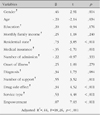Abstract
Purpose
The study was done to identify factors influencing the quality of life of people with mental disabilities who use mental health centers.
Methods
Data were collected by questionnaires from 288 people with mental disabilities in Busan and Kyungnam Provience. Data were analyzed using t-test, ANOVA, Pearson correlation coefficients, multiple linear regression with the SPSS/WIN 14.0 program.
Results
The mean score for quality of life was 11.3±1.70, and the mean empowerment score was 59.7±8.44. The significant factors influencing quality of life were gender, age, residential status, number of support people, side-effects of drugs, service type, and empowerment. These factors explained 43.9% of the variance.
Figures and Tables
References
1. Browne S, Clarke H, Gervin M, Wadding JL, Larkin C, O'Callaghan E. Determinants of quality of life at first presentation with schizophrenia. Br J Psychiatry. 2000; 176:173–176.

2. Cardoso CS, Caiaffa WT, Bandeira M, Siqueira AL, Abreu MN, Fonseca JO. Factors associated with low quality of life in schizophrenia. Cad Saude Publica. 2005; 21:1338–1348.

3. Caron J, Tempier R, Mercier C, Leouffre P. Components of social support and quality of life severely mentally ill, low income individuals and a general populationgroup. Community Ment Health J. 1998; 34:459–475.
5. Choi MM, Lee KY, Eom TW. Difference in empowerment and the quality of life among the users of the mental health service settings in Korea. Ment Health Soc Work. 2006; 24(12):94–124.
6. Choi YH. Overview of quality of life in psychiatry. J Korean Neuropsychiatr Assoc. 1997; 36(1):19–31.
7. Chun HS. A study on the influence of rehabilitative service effects on life satisfaction of people with mental disorders. Daegu: Daegu University;2006. Unpublished master's thesis.
8. Cohen J. Statistical power analysis for the behavioral science. 2nd ed. New Jersey: Lawrence Erlbaum;1988.
9. Corrigan PW. Empowerment and serious mental illness: Treatment partnership and community opportunities. Psychiatr Q. 2002; 73(3):217–228.
10. Daradkeh TK, Al Habeeb T. Quality of life of patients with schizophrenia. East Mediterr Health J. 2005; 11:898–904.
11. El-Bardi S, Mellsop G. Stigma and quality of life as experienced by people with mental illness. Australas Psychiatry. 2007; 15(3):195–200.

12. Gist ME. Self-efficacy: Implications for organizational behavior and human resource management. Acad Manag Rev. 1987; 12:472–485.

13. Ha KH. A study on the effectiveness of the empowerment practice perceived by community mental health service users. Seoul: Seoul National University;2007. Unpublished doctoral dissertation.
14. Han KS, Choo JN. The level of quality of life and its correlates across life cycles of city-dwelling adults in Korea. J Korean Acad Psychiatr Ment Health Nurs. 2009; 18:474–482.
15. Han KS, Lee PS, Park EY. Influencing factors on quality of life of chronic mental illness. J Korean Acad Psychiatr Ment Health Nurs. 2001; 10:265–275.
16. Han SS, Han JH, Yun EK. Predictors of employment intention for mentally disabled persons. J Korean Acad Nurs. 2008; 38:541–549.

17. Korea Ministry for Health, Welfare and Family Affairs. Mental health practice guideline. 2010. Retrieved 2010. fromhttp://www.mw.go.kr/front/jb/sjb0402vw.jsp?PAR_MENU_ID=03&MENU_ID=030402&BOARD_ID=220&BOARD_FLAG=04&CONT_SEQ=227255&page=1.
18. Lee JH, Seo MK. Effects of involvement in the program and program environments on social adjustment and life satisfaction of the mental illness. Korean J Soc Welf Stud. 2007; 35:67–92.
19. Lee SY. A study on the factors affecting quality of life of the mentally ill-with a focus on the mental health center. J Soc Work Pract. 2003; 3:125–147.
20. Lim JG. A study on the effect of social support on mental health disorder's empowerment-compared with residential type. Seoul: Ewha Womans University;1999. Unpublished master's thesis.
21. Min SK, Lee CI, Kim KI, Suh SY, Kim DK. Development of Korean version of WHO quality of life scale abbreviated version (WHOQOL-BREF). J Korean Neuropsychiatr Assoc. 2000; 39:571–579.
22. Parsons R. Empowerment: Purpose and practice in social work. Soc Work Groups. 1991; 14(2):27–43.
23. Rho ES, Kwon HJ, Rye EJ. A study on self-efficacy and quality of life in schizophrenic patients. J Korean Acad Nurs. 2001; 31:912–920.

24. Rogers ES, Chamberlin J, Ellison ML, Crean T. A consumer-constructed scale to measure empowerment among users of mental health services. Psychiatr Serv. 1997; 48(8):1042–1047.

25. Shin SH, Kim YH, Kim JS. Effects of community health service on the family support and quality of life of persons with serious mental illness. Korean Public Health Res. 2006; 32(2):113–119.
26. Ulas H, Akdede BB, Ozbay D, Alptekin K. Effect of though disorders on quality of life in patients with schizophrenia. Prog Neuropsychopharmacol Biol Psychiatry. 2008; 32(2):332–335.

27. World Health Organization. WHOQOL measuring quality of life. 1997. Access Date May 1 2009. from WHO web site: http://www.who.int/mental_health/media/68.pdf.
28. Yoon JS, Kook SH, Lee HY, Lee C, Park ZH. The development of a Korean modification of the scale to measure subjective well-being under neuroleptic treatment (KmSWN). J Korean Acad Psychiatr Ment Health Nurs. 2000; 39:987–998.




 PDF
PDF ePub
ePub Citation
Citation Print
Print






 XML Download
XML Download